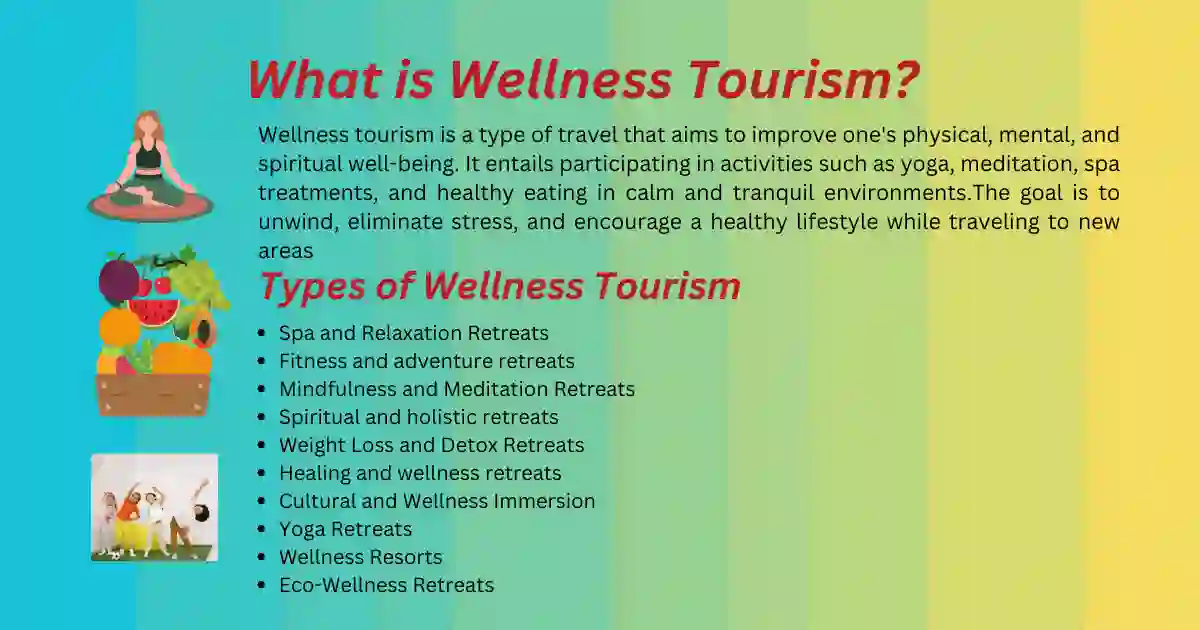
What is Wellness Tourism?
Wellness tourism has emerged as a transforming method to travel in the middle of our fast-paced lifestyles. It is more than just a vacation; it is an intentional pursuit of refreshment, personal growth, and health improvement. Wellness tourism comprises a wide range of experiences that balance the body, mind, and soul, from immersing spa vacations to stimulating fitness escapes.
The article digs into the complexities of wellness tourism, illuminating its various dimensions, showcasing its numerous benefits, and offering thorough ideas for going on a meaningful path of self-discovery and well-being. Join us as we journey into the realms of wellness tourism, where travel is transformed into a vehicle for holistic development and profound investigation.
Wellness Tourism
Wellness tourism is a type of travel that aims to improve one's physical, mental, and spiritual well-being. It entails participating in activities such as yoga, meditation, spa treatments, and healthy eating in calm and tranquil environments. The goal is to unwind, eliminate stress, and encourage a healthy lifestyle while traveling to new areas.
Types of Wellness Tourism
Wellness tourism is defined as travel that prioritizes an individual's well-being, including physical, mental, emotional, and spiritual components of health. This style of tourism is concerned with rejuvenation, relaxation, personal development, and overall well-being. There are various sorts of wellness tourism experiences that address various areas of well-being. Among the most prevalent varieties are:
Spa and Relaxation Retreats
These retreats provide tourists with a variety of spa treatments, massages, yoga, meditation, and relaxation activities to help them rest and refresh.
Fitness and Adventure Retreats
These focus on physical fitness, with activities such as hiking, yoga, Pilates, boot camps, and other training programs available.
Mindfulness and Meditation Retreats
These retreats provide a setting for people to practice mindfulness, meditation, and stress-reduction practices, allowing them to reconnect with their inner selves.
Spiritual and Holistic Retreats
This is focused on spiritual development, self-discovery, and connecting with higher consciousness. They may include practices such as meditation, energy healing, and spiritual workshops.
Weight Loss and Detox Retreats
Through specialized nutrition plans and wellness activities, these programs assist clients in losing weight, improving their food habits, and undergoing detoxification processes.
Healing and Wellness Retreats
Acupuncture, Ayurveda, traditional Chinese medicine, and other alternative therapeutic methods are available at healing and wellness retreats.
Cultural and Wellness Immersion
These experiences combine wellness activities with cultural immersion, allowing travelers to immerse themselves in local traditions, cuisine, and wellness practices.
Yoga Retreats
In calm and tranquil surroundings, yoga-focused retreats provide intensive yoga classes, workshops, and opportunities to deepen one's practice.
Wellness Resorts
These are hotels that are dedicated to wellness and include a variety of services and activities to encourage relaxation, health, and well-being.
Eco-Wellness Retreats
These retreats, which are centered on sustainability and connection with nature, frequently include outdoor activities, eco-friendly practices, and an emphasis on the natural environment.
Retreats for Mental Health and Emotional Well-being
Through workshops, counseling sessions, and mindfulness practices, these retreats address emotional well-being, stress management, and mental health.
Medical Wellness Tourism
This type of tourism combines medical treatments with wellness experiences, and it entails traveling for medical operations, followed by rehabilitation and relaxation in a wellness-focused setting.
How Does Wellness Tourism Work?
Travelers seeking wellness tourism seek destinations and experiences that prioritize their well-being, including relaxation, renewal, personal growth, and improved health. Travelers purchase lodgings that promote well-being after researching and selecting an appropriate destination and partaking in activities such as spa treatments, yoga, meditation, and outdoor experiences.
Personalized wellness regimens, professional consultations, and cultural immersion enrich the experience. Participants focus on relaxation and self-care by withdrawing from routines, returning to regular life with increased well-being insights, and often adopting healthier habits.
Wellness tourism encourages continuing exploration of wellness practices and places for long-term advantages, promoting a holistic approach to health.